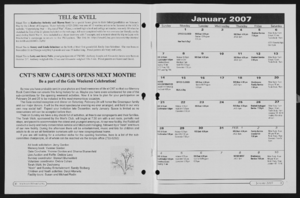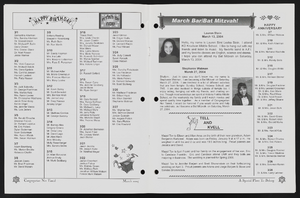Search the Special Collections and Archives Portal
Search Results

Transcript of interview with Dayvid Figler by Barbara Tabach, June 22, 2016
Date
Archival Collection
Description
Dayvid Figler (1967 - ) is the quiet boy who became an insightful and creative contributor to the local culture of Las Vegas. The oldest of Barbara and Meyer Figler?s three children, he was four years old when the family station wagon reached Las Vegas in 1971. They moved in with Uncle Izzy (aka Big Irish) Figler for a few months. Having the ?juice,? Dayvid?s father soon became a Pan dealer on the Strip. As the family grew, Barbara eventually immersed her energies in her children?s activities, Hadassah and Temple Beth Sholom. In this oral history, Dayvid also recalls his awkward, but incredibly interesting youth, his bar mitzvah at Temple Beth Sholom, and path to a successful career as a criminal defense attorney. He also talks about embracing Las Vegas as his home, owning a home in John S. Park neighborhood and mentions a number of literary depictions of Las Vegas that he admires. Dayvid describes growing up a ?casino kid? who lived in an apartment near the Riviera Hotel. This, in addition to his slight stature and academic brilliance, may have set him apart from many of his childhood peers. He graduated from Valley High School at the age of 16 and by the age of 23 he was a rising star in the legal world. He looks back with appreciation to his list of mentors who encouraged him along the way. Dayvid is also a local favorite as an essayist and poet. For a number of years he could be heard on KNPR/NPR. He has been a performer in hundreds of productions that featured his comic wit and writings, from Lollapalooza to Tom and Jerry?s on Maryland Parkway.
Text

Transcript of interview with Jean Tobman, Marilyn Moran and Janie Moore by Claytee D. White, November 5, 2013
Date
Archival Collection
Description
Interview with Jean Tobman and two of her daughters, Marilyn (Tobman) Moran and Janie (Tobman) Moore by Claytee White, November 5, 2013. In this interview, Jean Tobman recalls coming to Las Vegas with her husband and two young children in the 1950s, and the life they established in the Pinto area of the Westside. Her husband, Herb, owned City Furniture and a cab company near downtown. Marilyn and Janie discuss their youth and the enjoyable time they had growing up in Las Vegas. Marilyn talks about how the city has grown and her time on the planning commission. Janie also discusses the growth of Las Vegas and her nostalgia for old Las Vegas.
In 1953, Jean and Herb Tobman moved from New Jersey to Las Vegas. The Tombans settled in the Pinto Palamino. Upon moving, Jean initially assisted her mother at her rooming house, and Herb worked with Jean's father at City Furniture. Herb bought his first cab soon thereafter, and grew one vehicle into Western Cab Company, which is still family-run. After a large fire closed City Furniture, Herb worked as the general manager at Moulin Rouge, jumpstarting his career in the gaming industry. Marilyn, Janie and Helen are the children of Jean and Herb and all still live in Las Vegas. The girls grew up keeping horses, as did many other neighbors in the Pinto area. Marilyn married John Moran, the sheriff's son, who served as a police officer himself. She sat on the planning commission for a decade, during the city's growth spurt. Janie spent a semester at Arizona State University before returning to Las Vegas to work at Stardust Hotel, a property co-owned by her father, who also served as the its president.
Text

Transcript of interview with Renee Diamond by Barbara Tabach, November 20, 2014
Date
Archival Collection
Description
In this interview, Renee Diamond discusses coming to Las Vegas via Los Angeles, with her husband and children in the 1970s and getting involved in politics. She talks about her husband, Leo, and his business selling vinyl records in L.A., and her work in a doctor's office. Once in Las Vegas, the Diamonds joined Temple Beth Sholom and later Congregation Ner Tamid. Renee talks about her involvement in the political arena in southern Nevada, including the League of Women Voters.
Community activism and social justice rank high in the legacy of Renee Diamond. She often refers to herself as one of the last of the generation without college degrees that could make a difference in the politics of the state. When Renee, her husband Leo Diamond moved their family to Las Vegas from southern California, the energetic advocate Renee quickly plugged into the community. The word "No" was not part of her vocabulary. Among the many Jewish and secular activities the she engaged in were: the editorial board of the Jewish Reporter newspaper; Hadassah; Anti-Defamation League; Red Cross Board; State Museum Board to name a few. She remains a vibrant Democratic Party leader and served one term on the Nevada Assembly in 1989. She was on the front lines as a fierce and active supporter of Welfare Rights, Fair Housing and the Equal Rights Amendment. It is a life that included working alongside illustrious women and men of Southern Nevada history. A list that includes: Harriet Trudell, Ruby Duncan, Myrna Williams and Dorothy Eisenberg and many more mentioned here. Meanwhile she raised four children and enjoyed a loving 43-year marriage with Leo (aka "Uncle Leo") whose career included the popular Bingo Palace, Slots-A-Fun and Stations Casinos. During this oral history interview she recalls the Las Vegas that she moved to in 1972 and reflects on what attracted people here, ways to be part of the Jewish life which might even include a bowling league and how involvement in raising social awareness was a worthy investment of ones' time. This is a look at a woman who made a difference.
Text

Transcript of interview with Steven Eisen by Barbara Tabach, September 14, 2016
Date
Archival Collection
Description
Steven Eisen (1966 - ) is the oldest son of Barry and Beverly Eisen, who were part of the migration of Jews from St. Louis to Las Vegas in the 1960s. He is married to Stacy Fisher and the older brother to Andrew and Robert Eisen. They are members of an early group of born-and-raised Las Vegans. Growing up Jewish, he became a bar mitzvah, belonged to B?nai B?rith Youth Organization. In this oral history interview, Steve recalls enjoyable stories of growing up in Las Vegas and humorous anecdotes of mistaken identity since the three brothers bear such strong physical resemblances. Today he finds himself enjoying his career as CEO of the Children?s Heart Center since 2001 and talks about the success and reputation of the pediatric medical group. It was his first job as a fourteen year old helping Theodore Manos and Michael Cherry during the MGM fire litigations where he learned about the legal world and being organized as a path to success in whatever he might pursue. Steve graduated from University of Missouri, attended law school at Washington University in St. Louis, and received his business degree from UNLV. Throughout the interview, he recalls the steady and strong involvement of his parents in their sons? educations. He also describes their active connection with the Jewish community and organizations. Steve?s wife Stacy is a professor in physical therapy at Touro University.
Text

Meeting minutes for Consolidated Student Senate University of Nevada, Las Vegas, January 20, 1993
Date
Archival Collection
Description
Text

Interview with Leslie Ray Hill, February 17, 2006
Date
Archival Collection
Description
Text

Book, The Marshall Plan, by Jack Sheehan, 2013
Date
Description
Art Marshall is one of the founders of the Marshall-Rousso chain of women's dress shops that started in casinos in Las Vegas. He is also a banker, a member of the Nevada Gaming Commission, is active in the Anti-Defamation League and the Jewish Federation of Las Vegas, is an art collector, and is a philanthopist, especially for Jewish faith-based causes and for the University of Nevada, Las Vegas.
Text



